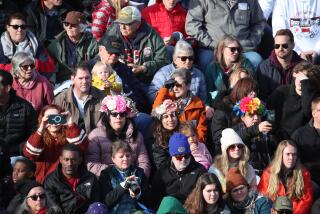China’s parade: 850,000 volunteers, 12,000 troops, plus monkeys, falcons and tanks and ...
Reporting from Beijing — For a gauge of how seriously Beijing is taking its upcoming military parade, just try driving around town. Or going to a hospital. Or flipping on the TV.
Authorities in the Chinese capital have pulled out all the stops to make sure that Thursday’s parade — intended to mark the 70th anniversary of Japan’s defeat at the end of World War II — goes according to plan.
They will temporarily shut several major roads, gas stations, shopping districts, concert halls, parks, bars, long-distance bus terminals, hospital outpatient departments and, on the morning of the event, even the city’s airports. They will dispatch 850,000 “volunteers” to stand on the sidewalks wearing bright red armbands, on the lookout for signs of trouble.
They will also clear the skies. The military has enlisted a squad of falcons and monkeys “to help protect … jets from the threat of flying birds,” state media reported Tuesday. Trainers at an unspecified air force base in Beijing have been methodically dispatching macaques to scamper up trees and destroy the birds’ nests, then sending falcons to frighten them away.
“Two of the macaques, named ‘Qitian’ and ‘Ziyun,’ can get rid of a nest in approximately one minute,” said a report on china.org.cn, a news website overseen by China’s State Council Information Office. “[The trainer] needs to shout ‘hurry up’ at times to encourage the hesitant monkeys, who receive rewards like corn for a job well done.”
“The falcons do not need to prey on other birds; their presence simply drives [them] off,” the report continued. “They are usually launched two hours before the jets, with three or four falcons needed each day to do the job.”
Beijing has been given a face lift for the parade, which will put more than 12,000 goose-stepping troops, as well as dozens of tanks, missiles and planes on display on Changan Avenue, a broad thoroughfare on the city’s east-west axis. Several heads of state, including Russian President Vladimir Putin and South Korean President Park Geun-hye, will be in attendance. (No North American or Western European heads of state will be present.)
Residents of buildings near Changan Avenue have been warned against opening their windows or standing on their balconies during the event. The city has shut down thousands of factories to clear the skies of pollution and mandated that many residents hang Chinese flags outside their homes and shops, turning the capital’s usually gray streets into streams of red and yellow.
“The war is being ramped up as an increasingly important touchstone for patriotism in the country,” said Rana Mitter, a professor of modern Chinese politics and history at the University of Oxford.
“I think there are two primary audiences for [the parade] — I’m not actually sure that the wider population of Beijing is necessarily one of them,” he said. “One of the audiences for this is the international community, and I think they are being sent a very clear message: that China is a country that has developed its military technology so that it … can no longer be invaded by Japan and other countries.
“The other audience,” he continued, “is more broadly within China.”
Li Jing, a 37-year-old teacher in Beijing, said that during parade rehearsals on Aug. 23, she wasn’t allowed to leave her residential compound, located near Changan Avenue. From inside, she could see hulking green tanks rolling down the city streets.
“At that time we could only drive out — but I’m not sure if they’ll even allow that this time around,” she said. “I think if they’re going to adopt these measures, they should post a notice in advance. But there hasn’t been any notice.”
Underscoring the political environment nationwide, even the local government in Chengdu, a metropolis in south-central China more than 1,000 miles from Beijing, has issued restrictions on drones and other aerial objects for six days “to ensure public safety and order.”
Complementing the closures and heightened security has been a flood of nationalistic and anti-Japanese propaganda. Propaganda officials have barred all television stations from broadcasting entertainment and drama programming for five days “to make way for content on the war against Japanese aggression,” according to the official New China News Agency.
In Beijing, schools will be closed; farther afield, they will be required to observe a strict patriotic routine. China’s Ministry of Education issued a notice last week declaring that “students from primary and secondary schools must participate in propaganda activities” and offering a list of suggestions, including holding flag-raising ceremonies, singing “red songs” and organizing discussions about the war.
The parade is “using a historical torch to illuminate the path towards peace,” said an editorial in the Communist Party mouthpiece People’s Daily on Tuesday morning.
The parade will “strengthen the peoples’ unity,” the nationalist tabloid Global Times said in an editorial last week.
“The military parade will certainly succeed, because the expectation of it to be successful has become the common attitude of Chinese society,” it said. “The unity of the Chinese people will ascend with each rehearsal. And when the grand military parade happens, this unity will reach its peak.”
Times staff writer Julie Makinen and Nicole Liu and Tommy Yang in The Times’ Beijing bureau contributed to this report
Follow @JRKaiman on Twitter for news from China
ALSO:
U.S. stocks plummet; Dow sinks below correction threshold
Video shows deputies shooting San Antonio man whose hands were raised
Northern Illinois police officer is shot and killed
More to Read
Sign up for Essential California
The most important California stories and recommendations in your inbox every morning.
You may occasionally receive promotional content from the Los Angeles Times.










